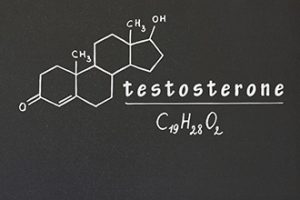

The reason the prostate grows so rapidly during puberty, is that it is fed by the androgens which make it possible for the prostate to produce seminal fluid. Androgens also stimulate the development of body hair, deepen the voice, and increase muscle bulk in the upper body.
The primary androgen is testosterone, but some androgens are produced by the adrenal glands which lie above each kidney. Briefly, here is how the process works:
The hypothalamus, a small gland at the base of the brain, produces leutinizing hormone-release hormone (LHRH).
LHRH acts on the nearby pituitary gland to produce leutinizing hormone (LH) and follicle-stimulating hormone (FSH) to stimulate secretion of androgens.
FSH acts on certain cells of the testes to produce sperm.
LH acts on other cells of the testes to produce testosterone, the primary androgen.
An enzyme called 5-alpha reductase converts testosterone to its active metabolic and more potent form, dihydrostestosterone (DHT).
DHT diffuses into prostate cells to influence growth such as the development of benign prostatic hyperplasia (BPH).
Adrenocorticotropic hormone (ACTH) is produced by the pituitary gland to act on adrenal glands to produce other androgens that can also influence prostate growth. Thus, while these androgens nourish the prostate, they can also nourish prostate cancer cells. Testosterone, for example, is responsible for cell division in the prostate. This is similar to what estrogen does in breast cancer in women. It is responsible for the growth of breasts, as well as the growth of breast cancer. The enlargement of the prostate in middle age may be caused by the complex relationship of aging and hormones, although this does not always lead to prostate cancer.
